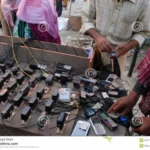In the last two weeks, we covered the uses to which funds are put in a business and the major types of finances for a business. Today we shall take up sources of funds for your business, which, for our purposes here, can simply be classified into two, viz; Informal and Formal.
Informal sources: These are sources of funds at which not much rigorous review of your business proposition or financing request is conducted. Usually, such sources tend to just be compassionate and even indulgent about the support they are providing to the entrepreneur as a person. Informal sources provide the entrepreneur with loans at concessionary or no interest at all as well as outright equity investment without much expectations, demands, conditions or even a legal intent. Other than the entrepreneur themselves, other informal sources of loans and investments are friends, family, professional colleagues, crowdfunding, etc.
- Kidnappers in FCT begin collection of ransom through banks
- I intend to start a political revolution from Katsina – Sen. Yar’adua
Informal sources are very good at helping to kick-start your business as they, usually, can provide funds timely and without preconditions. Similarly, informal sources can help finance limited expansion and growth of a budding business. Little documentation, if any, is done when funds are made available from these sources.
Inherent in the advantages of informal loans and investments are also its disadvantages. First, informal sources usually do not have much discretionary loanable and/or investible funds to meet large financing requirements of the entrepreneur. Secondly, the business is not subject to dispassionate reviews that can help strengthen it and eliminate or minimise avoidable wastages. Even worse than all that, if the entrepreneur does not do the right things in running the business very well and paying back the loans/recouping the investments, key life relationships can be strained.
To make a success of funding from informal sources, the entrepreneur should commit reasonable and verifiable personal resources to the business to demonstrate their confidence in the proposition. The entrepreneur should also understand and respect that people are trusting them with their life savings and investments, which must not be taken lightly. Consequently, the entrepreneur should be diligent and forthright not just in doing their best but in also providing regular details to the creditors and investors. Equally importantly, documentation should be done properly and in necessary details to keep records of terms, agreements and any expected performances.
Formal sources: This refers to those sources of funds at which your business proposition and your funds requisition are subjected to thorough reviews, analysis, tests and processing for ultimate approval or rejection. Furthermore, formal sources will, rightly, always and unambiguously seek to create a legal relationship with the entrepreneur and the business. But while informal sources usually have limits to the amounts they can loan to or invest in, formal sources are literally a boundless barn of financial resources.
In addition to loans and equity investments, formal sources of funds can also provide the entrepreneur with informed business intelligence and advisory that can help strengthen their business model, enhance operational efficiency and profitability. For the loans provided to your business, formal sources will often ask for a collateral to secure their exposure to you; they will charge interest as well as arrangement/management fees, default penalties, etc.; For equity investments, these sources will demand for a percentage shareholding of the business and perhaps some Board seat(s) and even certain executive management positions as well.
One of the big mistakes that budding entrepreneurs often make at the beginning, or some other growth stage of their business, is to be obsessed with their shareholding stake. Obviously, the more percentage you can retain the more control you may continue to have on your business and also the likely financial returns. But the timeless advice of the late Chief Gamaliel Onosode on this issue is for the entrepreneur to understand that a small percentage ownership of a great business can be so much more valuable and beneficial than a large percentage ownership of a not-so-great business.
Depending on whether you are taking in an equity investment or a loan, there may be different sources available to you. Private and public formal loan sources in Nigeria will include microfinance banks, commercial banks, government development finance institutions like the Bank of Agriculture, Bank of Industry, Nigeria Export -Import Bank, etc. The Central Bank of Nigeria provides massive direct and indirect financial support to businesses in Nigeria. We also have private and public sector agencies, incubators and accelerators that provide financial and non-financial support to entrepreneurs. These include National Directorate of Employment, Small and Medium Enterprises Development Agency of Nigeria, The Nigeria Incentive-Based Risk Sharing System for Agricultural Lending plc. etc. Formal sources of equity investment include ‘Angels’ and Venture Capitalists. Leasing companies provide finance and operating leases which can help make available equipment to your business.
In this and the last two Columns, we have tried to understand the usage of funds for business, the types of funds available to the entrepreneur for business, and the sources of funds for a business. However, different sources of different funds have different requirements and processes for granting a loan or making an investment. For the informal loan and credit sources, their requirements, as mentioned earlier, are usually simple, fairly fast and fluid. On the other hand, formal investment and loan sources have processes and standards that can take a life of their own! Next week, we shall conclude this topic by discussing formal loan requirements, processes and borrowing etiquettes, still on Entrepreneurship: Funding Your Business (IV).

 Join Daily Trust WhatsApp Community For Quick Access To News and Happenings Around You.
Join Daily Trust WhatsApp Community For Quick Access To News and Happenings Around You.


